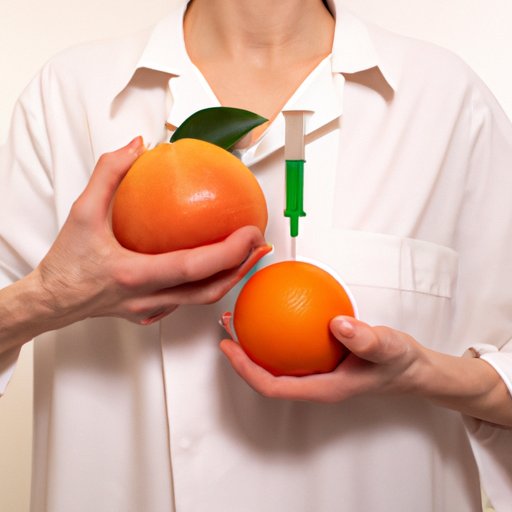
Understanding the Relationship Between Hair Loss and Common Vitamin Deficiencies
Have you ever noticed excessive hair fall or thinning hair? These might be the signs of vitamin deficiencies. There are numerous reasons for hair loss, but vitamins play a vital role in maintaining healthy hair growth. A diet rich in essential vitamins can help promote healthy hair growth, while a deficiency in vitamins can cause hair loss. In this guide, you’ll learn about the essential vitamins needed for healthy hair growth and how to overcome vitamin deficiencies to promote healthy hair growth.
The primary vitamins that are essential for healthy hair growth include Vitamin A, B vitamins, Vitamin C, Vitamin D, Vitamin E, and Iron. These vitamins play a vital role in the growth of hair follicles. Vitamin A helps produce sebum, which is a natural oil that moisturizes the scalp, whereas B vitamins and Vitamin C help produce collagen, which provides the structural integrity of hair strands. Vitamin D helps stimulate hair follicles, and Vitamin E is an antioxidant that protects hair from damage. Iron helps carry oxygen to hair follicles, an essential mineral for hair growth.
A deficiency in any of these vitamins can lead to hair loss. For instance, a deficiency in Vitamin A can cause dry hair, whereas an excess of Vitamin A can cause hair loss. A deficiency of B vitamins can lead to excessive hair fall, and if left untreated, it can lead to permanent hair loss. Similarly, a deficiency in Vitamin D can cause hair loss, and the same goes for Vitamin E and iron.
However, it’s essential to note that vitamin deficiencies aren’t the only reason for hair loss. Genetics, hormonal imbalances, and certain medical conditions can also cause hair loss.
Identifying and Overcoming Vitamin Deficiencies to Promote Hair Growth
The first step in identifying potential vitamin deficiencies is to go to your healthcare professional and discuss the symptoms that you’ve been experiencing. They may recommend a blood test or a hair analysis to identify any deficiencies. Once identified, it is essential to address these deficiencies through dietary changes or supplements.
You can add foods to your diet that are rich in the specific vitamins that you’re deficient in. For example, leafy greens, sweet potatoes, and carrots are high in Vitamin A, whole grains and nuts are high in Vitamin B, citrus fruits and bell peppers are high in Vitamin C, fatty fish and mushrooms are high in Vitamin D, and nuts and seeds are high in Vitamin E and Iron.
If your diet doesn’t provide enough of a specific vitamin, supplements can be taken, but it’s important to speak with your healthcare professional first before taking any supplements. They can help you determine the right dosage, as taking too much of a specific vitamin can have negative health consequences.
The Impact of Vitamin Deficiencies on Scalp Health
Vitamins not only play an essential role in hair growth but also scalp health. A healthy scalp produces a healthy and robust hair strand. Vitamin deficiencies can cause dry, flaky, and itchy scalp, which can lead to hair breakage and hair fall.
To promote scalp health, make sure to include foods rich in vitamins and minerals that support healthy scalp tissue. For example, berries and leafy greens are rich in Vitamin C, which can help prevent dandruff. Foods containing Omega-3 Fatty Acids, such as avocado and fatty fish, can also help hydrate and nourish the scalp, promoting healthy hair growth.
Using Nutrition to Promote Healthy Hair Growth
Getting the right nutrition is essential for healthy hair growth. Foods rich in protein, amino acids, and Omega-3 Fatty Acids are critical for healthy hair growth. Amino acids, which are the building blocks of protein, help produce keratin, which is a protein responsible for hair growth. Omega-3 Fatty Acids help promote hair thickness and prevent hair breakage.
Greek yogurt, lentils, and quinoa are excellent sources of protein and amino acids. If you’re looking for Omega-3 Fatty Acids, try incorporating salmon, walnuts, flaxseeds, and chia seeds into your diet.
While it’s always best to get your essential nutrients from whole foods, if you’re still having difficulty getting enough nutrients, supplements can also help. However, it’s essential to note that supplements should never replace a healthy diet.
The Link Between Poor Diet and Hair Loss
Your diet plays a vital role in hair health. A diet that lacks essential vitamins and minerals can cause hair loss. It’s essential to maintain a healthy, balanced diet to promote healthy hair growth.
Processed foods and foods high in sugar can lead to inflammation and oxidative stress on the body, which can damage hair follicles and lead to hair loss. Consuming foods that are high in vitamin A, vitamin E, vitamin D, and iron can help prevent hair loss.
It’s essential to consult with a healthcare professional or a licensed dietitian to determine the right diet for you.
Conclusion
Vitamin deficiencies can cause hair loss, but with proper nutrition, you can overcome these deficiencies and promote healthy hair growth. It’s essential to identify and address any potential vitamin deficiencies, but it’s equally important to consult with a healthcare professional before making any significant changes to your diet or supplement intake. By maintaining a healthy diet and an active lifestyle, you can help promote healthy hair growth and prevent hair loss.





